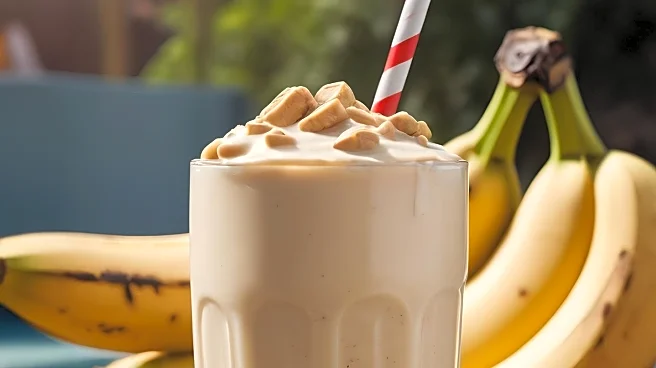What's Happening?
Researchers at the University of California-Davis have discovered that adding bananas to smoothies can significantly reduce the absorption of flavanols, compounds known for their benefits to brain and
heart health. The study, led by Javier Ottaviani, found that the enzyme polyphenol oxidase (PPO) present in bananas interferes with flavanol absorption. Participants in the study consumed two types of smoothies: one with bananas and another with mixed berries. The results showed that those who drank the banana smoothie had 84% lower flavanol levels compared to those who consumed a flavanol capsule. The findings suggest that bananas may hinder the body's ability to absorb these beneficial compounds, which are also found in foods like apples, berries, cocoa, and grapes.
Why It's Important?
The study's findings have implications for dietary recommendations, particularly for individuals seeking to enhance their brain and heart health through flavanol-rich foods. Flavanols are associated with improved memory, reduced inflammation, and better blood flow. The Academy of Nutrition and Dietetics recommends a daily intake of 400 to 600 milligrams of flavanols for cardiometabolic health. This research suggests that food preparation methods, such as the inclusion of bananas in smoothies, can impact nutrient absorption, potentially affecting health outcomes. The study opens avenues for further research on how different food combinations and preparation techniques influence the bioavailability of essential nutrients.
What's Next?
The study encourages further exploration into how food preparation affects nutrient absorption, with potential implications for dietary guidelines and health recommendations. Researchers may investigate other common food combinations and preparation methods to understand their impact on nutrient bioavailability. Additionally, the findings could influence consumer choices, prompting individuals to reconsider the ingredients they use in smoothies and other blended foods. The research, funded by Mars Inc., highlights the need for continued studies on the health benefits of flavanols and how they can be maximized through dietary practices.
Beyond the Headlines
The study raises questions about the broader implications of food preparation on nutrient absorption and health. It suggests a need for increased awareness of how everyday dietary choices can affect the body's ability to utilize essential nutrients. This research could lead to a reevaluation of common dietary practices and encourage more personalized nutrition strategies that consider individual metabolic responses to food combinations.









